Organisational Behaviour: Impact of Culture, Motivation at Tesco Plc
VerifiedAdded on 2023/06/18
|16
|4889
|255
Report
AI Summary
This report provides a comprehensive analysis of organisational behaviour, focusing on the impact of culture, politics, and power on individual and team performance within a business context. It evaluates content and process theories of motivation, including Maslow's hierarchy of needs and Herzberg's two-factor theory, and examines motivational techniques for effective goal accomplishment. The report also differentiates between effective and ineffective teams, analysing relevant theories of group development to foster cooperation. Finally, it applies these concepts and philosophies to Tesco Plc, illustrating how organisational behaviour influences and informs behaviour within a specific company situation. Desklib offers a variety of resources, including solved assignments and past papers, to further assist students in understanding these complex topics.
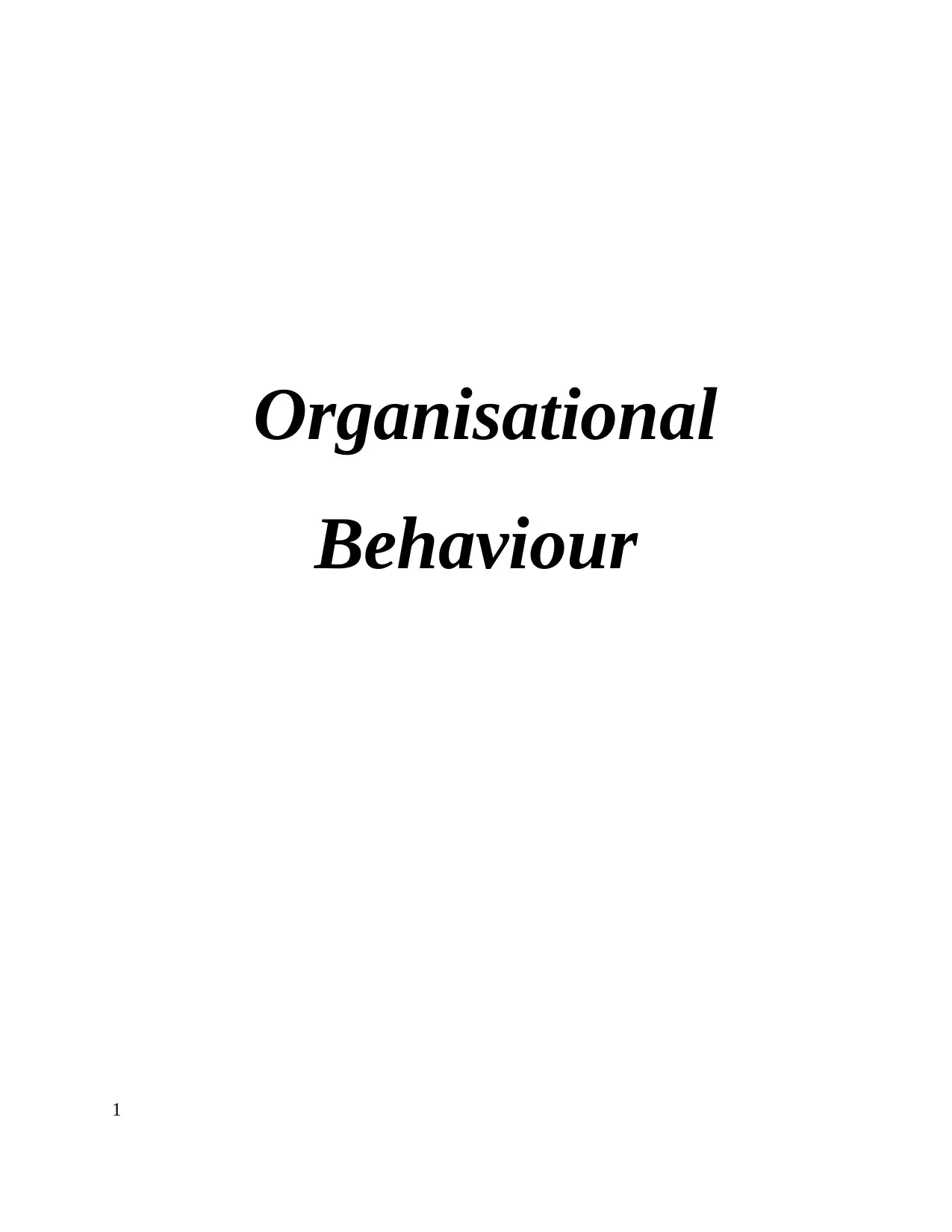
Organisational
Behaviour
1
Behaviour
1
Paraphrase This Document
Need a fresh take? Get an instant paraphrase of this document with our AI Paraphraser
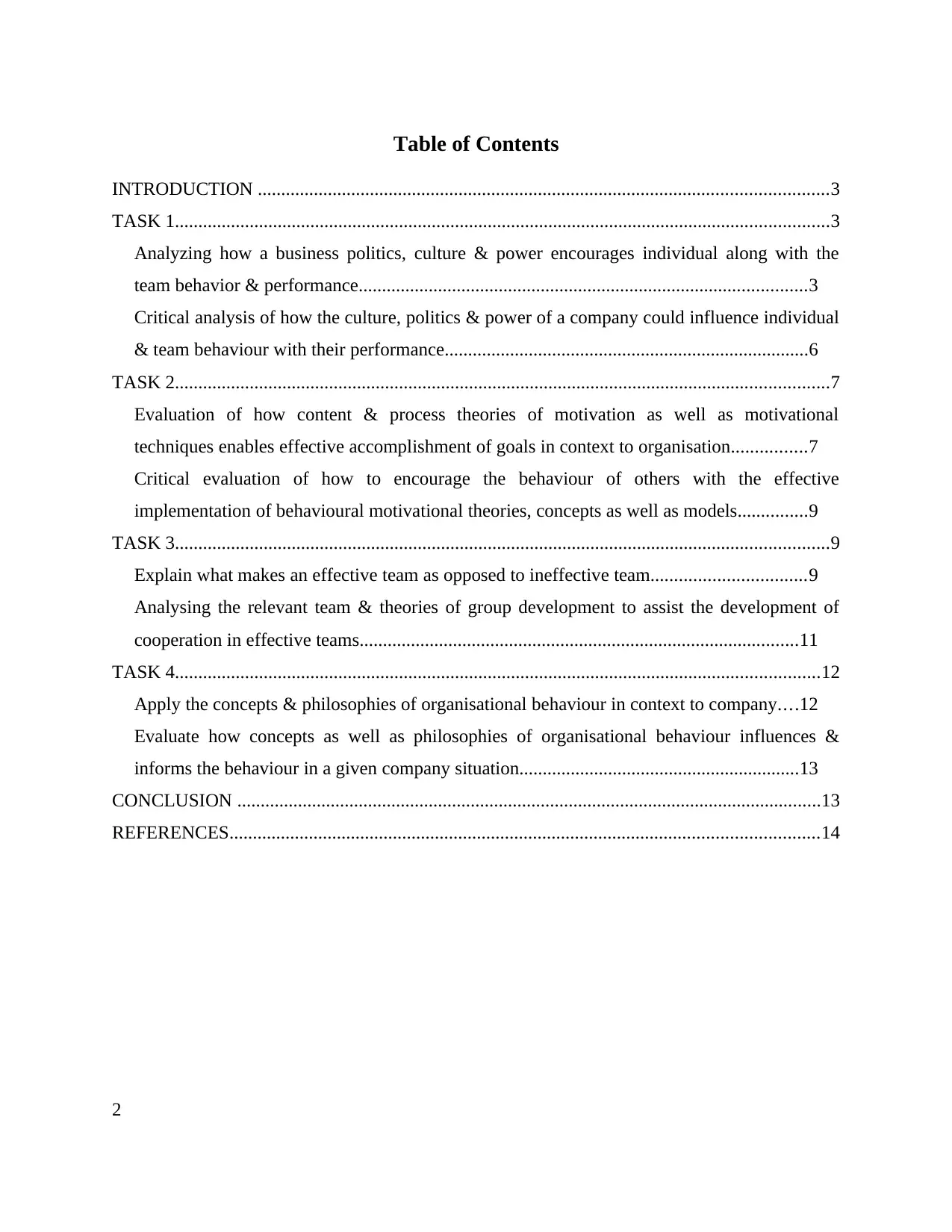
Table of Contents
INTRODUCTION ..........................................................................................................................3
TASK 1............................................................................................................................................3
Analyzing how a business politics, culture & power encourages individual along with the
team behavior & performance................................................................................................3
Critical analysis of how the culture, politics & power of a company could influence individual
& team behaviour with their performance..............................................................................6
TASK 2............................................................................................................................................7
Evaluation of how content & process theories of motivation as well as motivational
techniques enables effective accomplishment of goals in context to organisation................7
Critical evaluation of how to encourage the behaviour of others with the effective
implementation of behavioural motivational theories, concepts as well as models...............9
TASK 3............................................................................................................................................9
Explain what makes an effective team as opposed to ineffective team.................................9
Analysing the relevant team & theories of group development to assist the development of
cooperation in effective teams..............................................................................................11
TASK 4..........................................................................................................................................12
Apply the concepts & philosophies of organisational behaviour in context to company....12
Evaluate how concepts as well as philosophies of organisational behaviour influences &
informs the behaviour in a given company situation............................................................13
CONCLUSION .............................................................................................................................13
REFERENCES..............................................................................................................................14
2
INTRODUCTION ..........................................................................................................................3
TASK 1............................................................................................................................................3
Analyzing how a business politics, culture & power encourages individual along with the
team behavior & performance................................................................................................3
Critical analysis of how the culture, politics & power of a company could influence individual
& team behaviour with their performance..............................................................................6
TASK 2............................................................................................................................................7
Evaluation of how content & process theories of motivation as well as motivational
techniques enables effective accomplishment of goals in context to organisation................7
Critical evaluation of how to encourage the behaviour of others with the effective
implementation of behavioural motivational theories, concepts as well as models...............9
TASK 3............................................................................................................................................9
Explain what makes an effective team as opposed to ineffective team.................................9
Analysing the relevant team & theories of group development to assist the development of
cooperation in effective teams..............................................................................................11
TASK 4..........................................................................................................................................12
Apply the concepts & philosophies of organisational behaviour in context to company....12
Evaluate how concepts as well as philosophies of organisational behaviour influences &
informs the behaviour in a given company situation............................................................13
CONCLUSION .............................................................................................................................13
REFERENCES..............................................................................................................................14
2
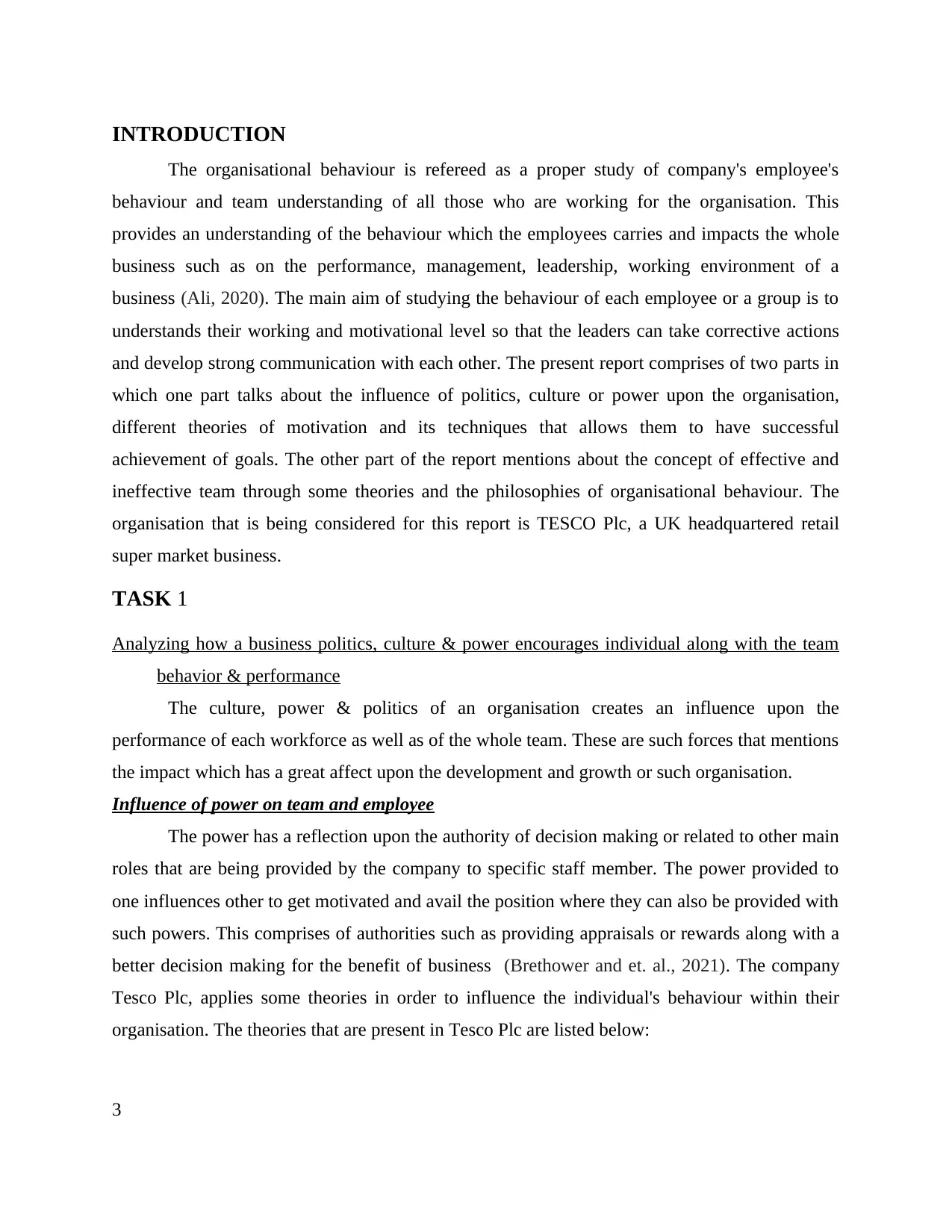
INTRODUCTION
The organisational behaviour is refereed as a proper study of company's employee's
behaviour and team understanding of all those who are working for the organisation. This
provides an understanding of the behaviour which the employees carries and impacts the whole
business such as on the performance, management, leadership, working environment of a
business (Ali, 2020). The main aim of studying the behaviour of each employee or a group is to
understands their working and motivational level so that the leaders can take corrective actions
and develop strong communication with each other. The present report comprises of two parts in
which one part talks about the influence of politics, culture or power upon the organisation,
different theories of motivation and its techniques that allows them to have successful
achievement of goals. The other part of the report mentions about the concept of effective and
ineffective team through some theories and the philosophies of organisational behaviour. The
organisation that is being considered for this report is TESCO Plc, a UK headquartered retail
super market business.
TASK 1
Analyzing how a business politics, culture & power encourages individual along with the team
behavior & performance
The culture, power & politics of an organisation creates an influence upon the
performance of each workforce as well as of the whole team. These are such forces that mentions
the impact which has a great affect upon the development and growth or such organisation.
Influence of power on team and employee
The power has a reflection upon the authority of decision making or related to other main
roles that are being provided by the company to specific staff member. The power provided to
one influences other to get motivated and avail the position where they can also be provided with
such powers. This comprises of authorities such as providing appraisals or rewards along with a
better decision making for the benefit of business (Brethower and et. al., 2021). The company
Tesco Plc, applies some theories in order to influence the individual's behaviour within their
organisation. The theories that are present in Tesco Plc are listed below:
3
The organisational behaviour is refereed as a proper study of company's employee's
behaviour and team understanding of all those who are working for the organisation. This
provides an understanding of the behaviour which the employees carries and impacts the whole
business such as on the performance, management, leadership, working environment of a
business (Ali, 2020). The main aim of studying the behaviour of each employee or a group is to
understands their working and motivational level so that the leaders can take corrective actions
and develop strong communication with each other. The present report comprises of two parts in
which one part talks about the influence of politics, culture or power upon the organisation,
different theories of motivation and its techniques that allows them to have successful
achievement of goals. The other part of the report mentions about the concept of effective and
ineffective team through some theories and the philosophies of organisational behaviour. The
organisation that is being considered for this report is TESCO Plc, a UK headquartered retail
super market business.
TASK 1
Analyzing how a business politics, culture & power encourages individual along with the team
behavior & performance
The culture, power & politics of an organisation creates an influence upon the
performance of each workforce as well as of the whole team. These are such forces that mentions
the impact which has a great affect upon the development and growth or such organisation.
Influence of power on team and employee
The power has a reflection upon the authority of decision making or related to other main
roles that are being provided by the company to specific staff member. The power provided to
one influences other to get motivated and avail the position where they can also be provided with
such powers. This comprises of authorities such as providing appraisals or rewards along with a
better decision making for the benefit of business (Brethower and et. al., 2021). The company
Tesco Plc, applies some theories in order to influence the individual's behaviour within their
organisation. The theories that are present in Tesco Plc are listed below:
3
⊘ This is a preview!⊘
Do you want full access?
Subscribe today to unlock all pages.

Trusted by 1+ million students worldwide
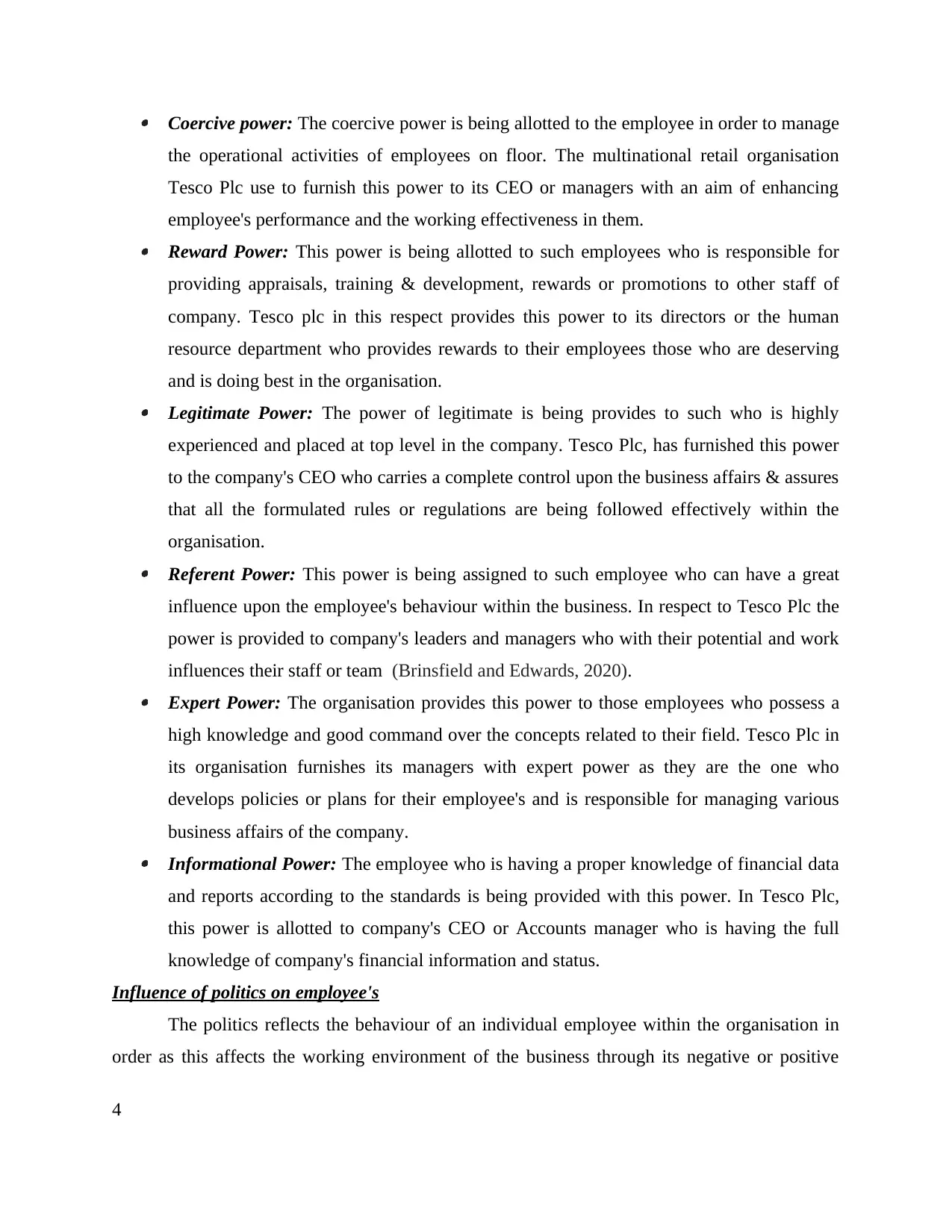
Coercive power: The coercive power is being allotted to the employee in order to manage
the operational activities of employees on floor. The multinational retail organisation
Tesco Plc use to furnish this power to its CEO or managers with an aim of enhancing
employee's performance and the working effectiveness in them. Reward Power: This power is being allotted to such employees who is responsible for
providing appraisals, training & development, rewards or promotions to other staff of
company. Tesco plc in this respect provides this power to its directors or the human
resource department who provides rewards to their employees those who are deserving
and is doing best in the organisation. Legitimate Power: The power of legitimate is being provides to such who is highly
experienced and placed at top level in the company. Tesco Plc, has furnished this power
to the company's CEO who carries a complete control upon the business affairs & assures
that all the formulated rules or regulations are being followed effectively within the
organisation. Referent Power: This power is being assigned to such employee who can have a great
influence upon the employee's behaviour within the business. In respect to Tesco Plc the
power is provided to company's leaders and managers who with their potential and work
influences their staff or team (Brinsfield and Edwards, 2020). Expert Power: The organisation provides this power to those employees who possess a
high knowledge and good command over the concepts related to their field. Tesco Plc in
its organisation furnishes its managers with expert power as they are the one who
develops policies or plans for their employee's and is responsible for managing various
business affairs of the company. Informational Power: The employee who is having a proper knowledge of financial data
and reports according to the standards is being provided with this power. In Tesco Plc,
this power is allotted to company's CEO or Accounts manager who is having the full
knowledge of company's financial information and status.
Influence of politics on employee's
The politics reflects the behaviour of an individual employee within the organisation in
order as this affects the working environment of the business through its negative or positive
4
the operational activities of employees on floor. The multinational retail organisation
Tesco Plc use to furnish this power to its CEO or managers with an aim of enhancing
employee's performance and the working effectiveness in them. Reward Power: This power is being allotted to such employees who is responsible for
providing appraisals, training & development, rewards or promotions to other staff of
company. Tesco plc in this respect provides this power to its directors or the human
resource department who provides rewards to their employees those who are deserving
and is doing best in the organisation. Legitimate Power: The power of legitimate is being provides to such who is highly
experienced and placed at top level in the company. Tesco Plc, has furnished this power
to the company's CEO who carries a complete control upon the business affairs & assures
that all the formulated rules or regulations are being followed effectively within the
organisation. Referent Power: This power is being assigned to such employee who can have a great
influence upon the employee's behaviour within the business. In respect to Tesco Plc the
power is provided to company's leaders and managers who with their potential and work
influences their staff or team (Brinsfield and Edwards, 2020). Expert Power: The organisation provides this power to those employees who possess a
high knowledge and good command over the concepts related to their field. Tesco Plc in
its organisation furnishes its managers with expert power as they are the one who
develops policies or plans for their employee's and is responsible for managing various
business affairs of the company. Informational Power: The employee who is having a proper knowledge of financial data
and reports according to the standards is being provided with this power. In Tesco Plc,
this power is allotted to company's CEO or Accounts manager who is having the full
knowledge of company's financial information and status.
Influence of politics on employee's
The politics reflects the behaviour of an individual employee within the organisation in
order as this affects the working environment of the business through its negative or positive
4
Paraphrase This Document
Need a fresh take? Get an instant paraphrase of this document with our AI Paraphraser
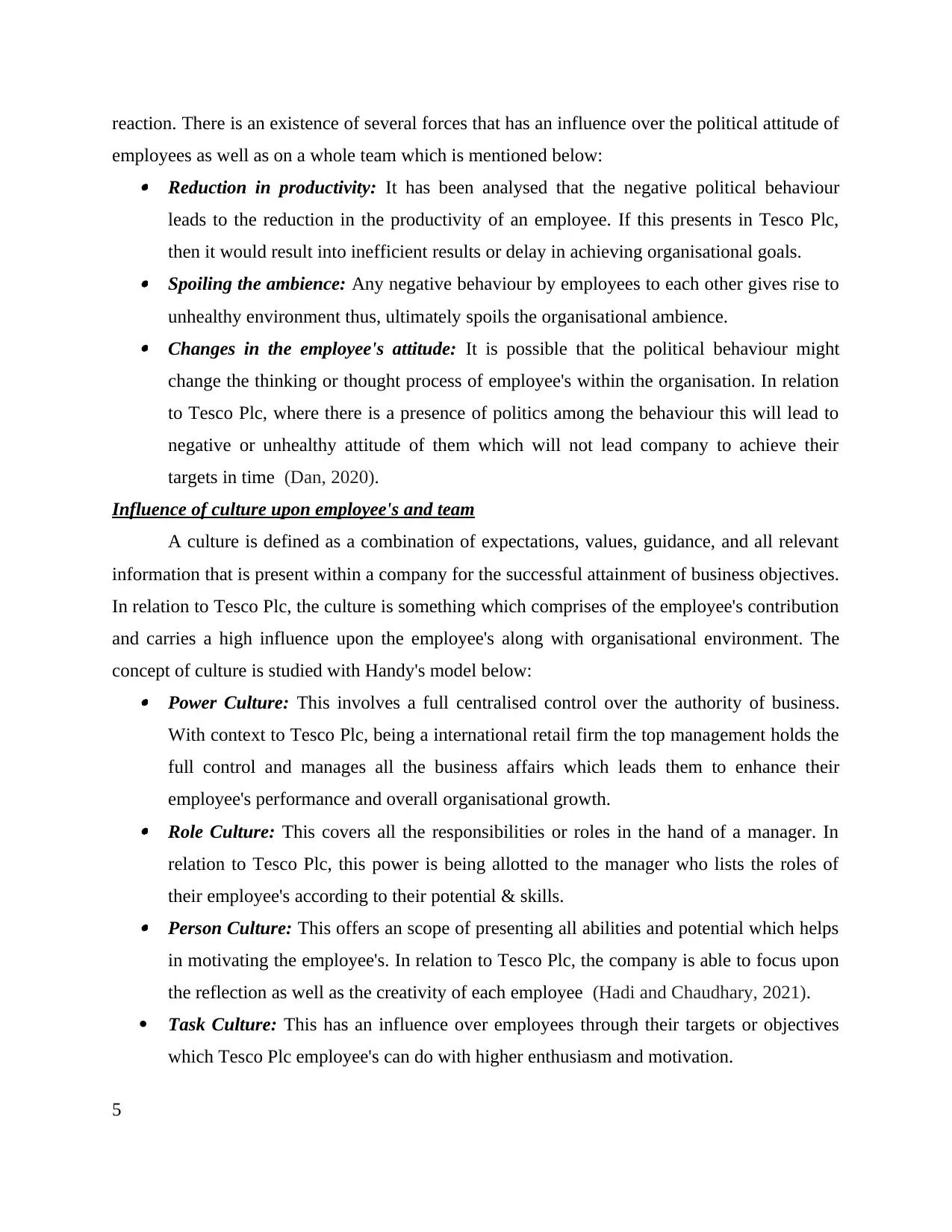
reaction. There is an existence of several forces that has an influence over the political attitude of
employees as well as on a whole team which is mentioned below: Reduction in productivity: It has been analysed that the negative political behaviour
leads to the reduction in the productivity of an employee. If this presents in Tesco Plc,
then it would result into inefficient results or delay in achieving organisational goals. Spoiling the ambience: Any negative behaviour by employees to each other gives rise to
unhealthy environment thus, ultimately spoils the organisational ambience. Changes in the employee's attitude: It is possible that the political behaviour might
change the thinking or thought process of employee's within the organisation. In relation
to Tesco Plc, where there is a presence of politics among the behaviour this will lead to
negative or unhealthy attitude of them which will not lead company to achieve their
targets in time (Dan, 2020).
Influence of culture upon employee's and team
A culture is defined as a combination of expectations, values, guidance, and all relevant
information that is present within a company for the successful attainment of business objectives.
In relation to Tesco Plc, the culture is something which comprises of the employee's contribution
and carries a high influence upon the employee's along with organisational environment. The
concept of culture is studied with Handy's model below: Power Culture: This involves a full centralised control over the authority of business.
With context to Tesco Plc, being a international retail firm the top management holds the
full control and manages all the business affairs which leads them to enhance their
employee's performance and overall organisational growth. Role Culture: This covers all the responsibilities or roles in the hand of a manager. In
relation to Tesco Plc, this power is being allotted to the manager who lists the roles of
their employee's according to their potential & skills. Person Culture: This offers an scope of presenting all abilities and potential which helps
in motivating the employee's. In relation to Tesco Plc, the company is able to focus upon
the reflection as well as the creativity of each employee (Hadi and Chaudhary, 2021).
Task Culture: This has an influence over employees through their targets or objectives
which Tesco Plc employee's can do with higher enthusiasm and motivation.
5
employees as well as on a whole team which is mentioned below: Reduction in productivity: It has been analysed that the negative political behaviour
leads to the reduction in the productivity of an employee. If this presents in Tesco Plc,
then it would result into inefficient results or delay in achieving organisational goals. Spoiling the ambience: Any negative behaviour by employees to each other gives rise to
unhealthy environment thus, ultimately spoils the organisational ambience. Changes in the employee's attitude: It is possible that the political behaviour might
change the thinking or thought process of employee's within the organisation. In relation
to Tesco Plc, where there is a presence of politics among the behaviour this will lead to
negative or unhealthy attitude of them which will not lead company to achieve their
targets in time (Dan, 2020).
Influence of culture upon employee's and team
A culture is defined as a combination of expectations, values, guidance, and all relevant
information that is present within a company for the successful attainment of business objectives.
In relation to Tesco Plc, the culture is something which comprises of the employee's contribution
and carries a high influence upon the employee's along with organisational environment. The
concept of culture is studied with Handy's model below: Power Culture: This involves a full centralised control over the authority of business.
With context to Tesco Plc, being a international retail firm the top management holds the
full control and manages all the business affairs which leads them to enhance their
employee's performance and overall organisational growth. Role Culture: This covers all the responsibilities or roles in the hand of a manager. In
relation to Tesco Plc, this power is being allotted to the manager who lists the roles of
their employee's according to their potential & skills. Person Culture: This offers an scope of presenting all abilities and potential which helps
in motivating the employee's. In relation to Tesco Plc, the company is able to focus upon
the reflection as well as the creativity of each employee (Hadi and Chaudhary, 2021).
Task Culture: This has an influence over employees through their targets or objectives
which Tesco Plc employee's can do with higher enthusiasm and motivation.
5
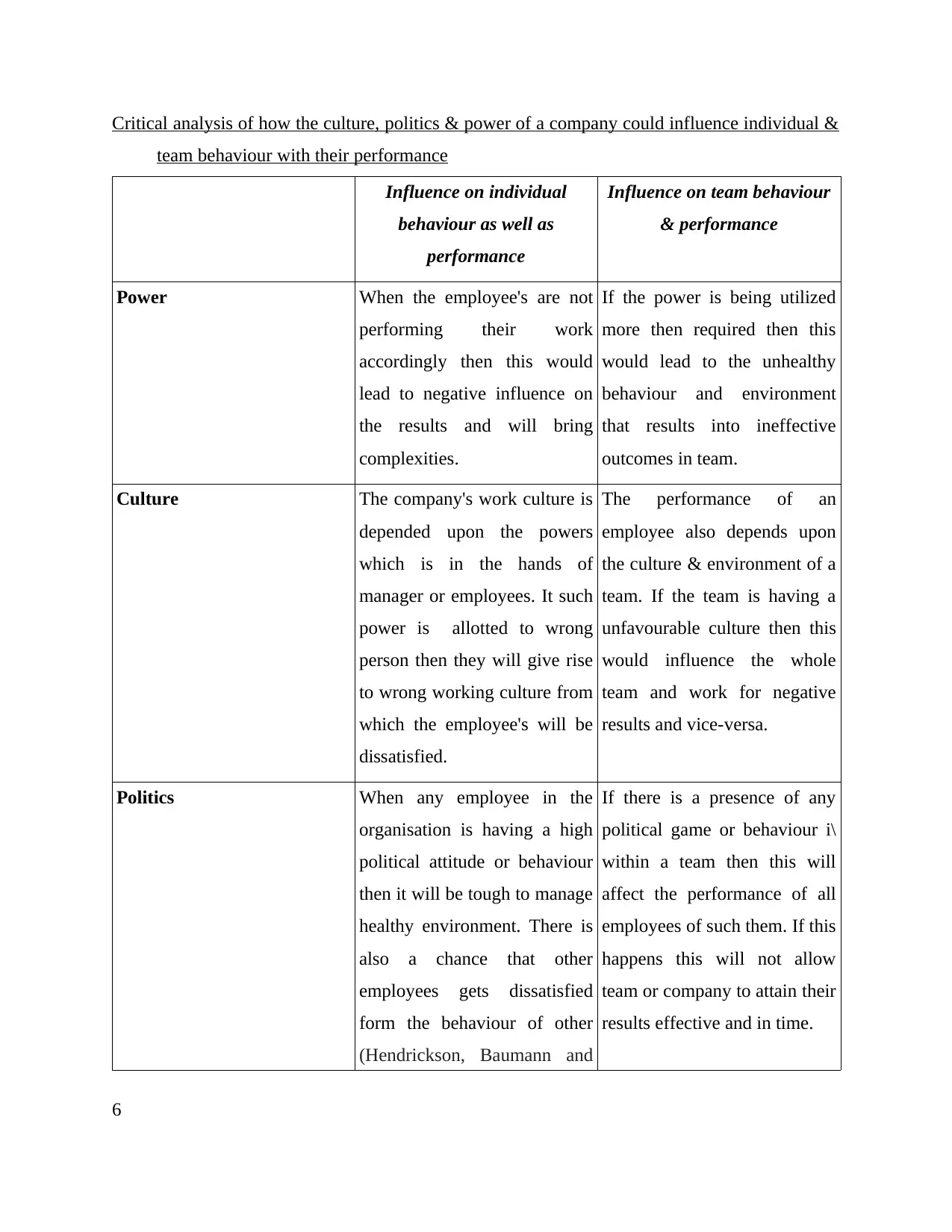
Critical analysis of how the culture, politics & power of a company could influence individual &
team behaviour with their performance
Influence on individual
behaviour as well as
performance
Influence on team behaviour
& performance
Power When the employee's are not
performing their work
accordingly then this would
lead to negative influence on
the results and will bring
complexities.
If the power is being utilized
more then required then this
would lead to the unhealthy
behaviour and environment
that results into ineffective
outcomes in team.
Culture The company's work culture is
depended upon the powers
which is in the hands of
manager or employees. It such
power is allotted to wrong
person then they will give rise
to wrong working culture from
which the employee's will be
dissatisfied.
The performance of an
employee also depends upon
the culture & environment of a
team. If the team is having a
unfavourable culture then this
would influence the whole
team and work for negative
results and vice-versa.
Politics When any employee in the
organisation is having a high
political attitude or behaviour
then it will be tough to manage
healthy environment. There is
also a chance that other
employees gets dissatisfied
form the behaviour of other
(Hendrickson, Baumann and
If there is a presence of any
political game or behaviour i\
within a team then this will
affect the performance of all
employees of such them. If this
happens this will not allow
team or company to attain their
results effective and in time.
6
team behaviour with their performance
Influence on individual
behaviour as well as
performance
Influence on team behaviour
& performance
Power When the employee's are not
performing their work
accordingly then this would
lead to negative influence on
the results and will bring
complexities.
If the power is being utilized
more then required then this
would lead to the unhealthy
behaviour and environment
that results into ineffective
outcomes in team.
Culture The company's work culture is
depended upon the powers
which is in the hands of
manager or employees. It such
power is allotted to wrong
person then they will give rise
to wrong working culture from
which the employee's will be
dissatisfied.
The performance of an
employee also depends upon
the culture & environment of a
team. If the team is having a
unfavourable culture then this
would influence the whole
team and work for negative
results and vice-versa.
Politics When any employee in the
organisation is having a high
political attitude or behaviour
then it will be tough to manage
healthy environment. There is
also a chance that other
employees gets dissatisfied
form the behaviour of other
(Hendrickson, Baumann and
If there is a presence of any
political game or behaviour i\
within a team then this will
affect the performance of all
employees of such them. If this
happens this will not allow
team or company to attain their
results effective and in time.
6
⊘ This is a preview!⊘
Do you want full access?
Subscribe today to unlock all pages.

Trusted by 1+ million students worldwide
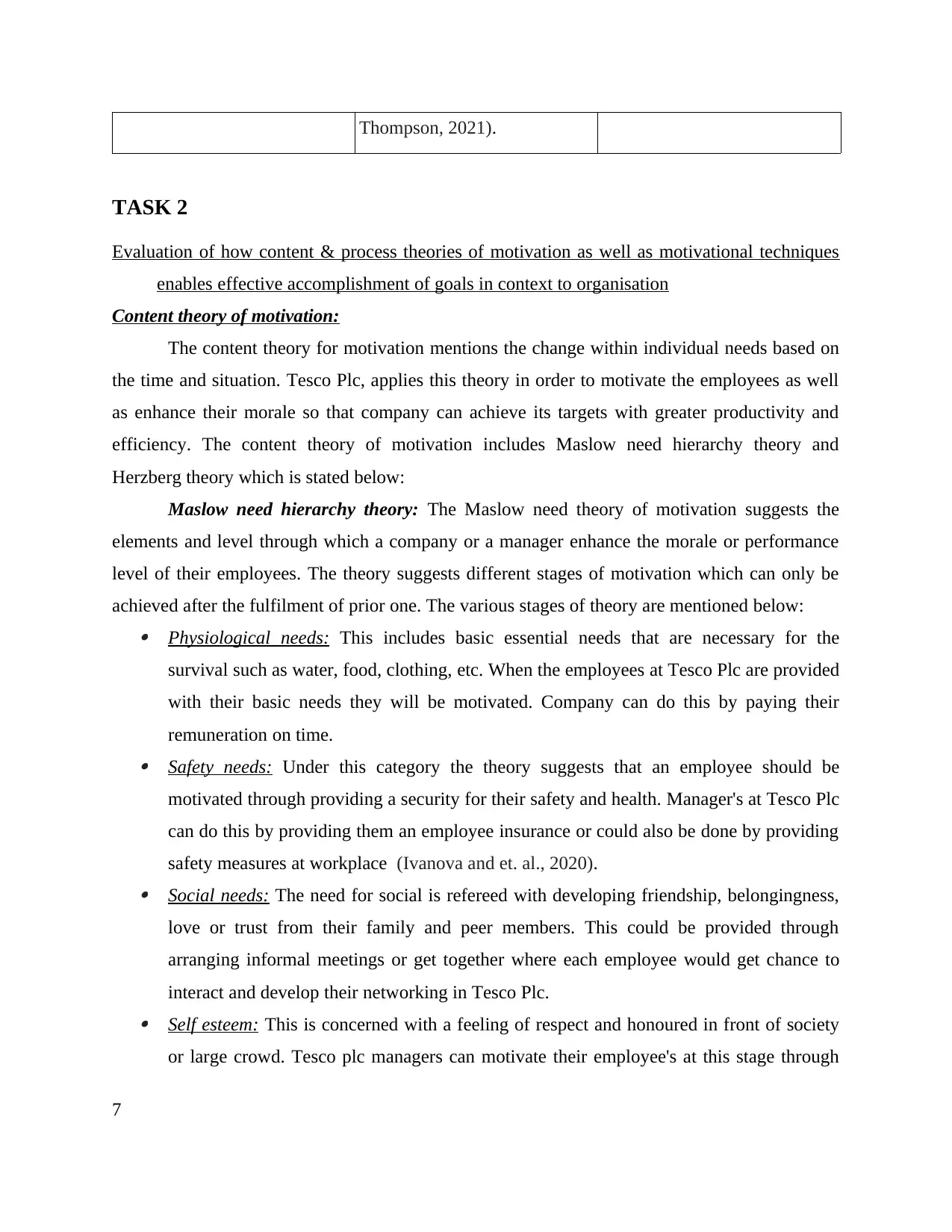
Thompson, 2021).
TASK 2
Evaluation of how content & process theories of motivation as well as motivational techniques
enables effective accomplishment of goals in context to organisation
Content theory of motivation:
The content theory for motivation mentions the change within individual needs based on
the time and situation. Tesco Plc, applies this theory in order to motivate the employees as well
as enhance their morale so that company can achieve its targets with greater productivity and
efficiency. The content theory of motivation includes Maslow need hierarchy theory and
Herzberg theory which is stated below:
Maslow need hierarchy theory: The Maslow need theory of motivation suggests the
elements and level through which a company or a manager enhance the morale or performance
level of their employees. The theory suggests different stages of motivation which can only be
achieved after the fulfilment of prior one. The various stages of theory are mentioned below: Physiological needs: This includes basic essential needs that are necessary for the
survival such as water, food, clothing, etc. When the employees at Tesco Plc are provided
with their basic needs they will be motivated. Company can do this by paying their
remuneration on time. Safety needs: Under this category the theory suggests that an employee should be
motivated through providing a security for their safety and health. Manager's at Tesco Plc
can do this by providing them an employee insurance or could also be done by providing
safety measures at workplace (Ivanova and et. al., 2020). Social needs: The need for social is refereed with developing friendship, belongingness,
love or trust from their family and peer members. This could be provided through
arranging informal meetings or get together where each employee would get chance to
interact and develop their networking in Tesco Plc. Self esteem: This is concerned with a feeling of respect and honoured in front of society
or large crowd. Tesco plc managers can motivate their employee's at this stage through
7
TASK 2
Evaluation of how content & process theories of motivation as well as motivational techniques
enables effective accomplishment of goals in context to organisation
Content theory of motivation:
The content theory for motivation mentions the change within individual needs based on
the time and situation. Tesco Plc, applies this theory in order to motivate the employees as well
as enhance their morale so that company can achieve its targets with greater productivity and
efficiency. The content theory of motivation includes Maslow need hierarchy theory and
Herzberg theory which is stated below:
Maslow need hierarchy theory: The Maslow need theory of motivation suggests the
elements and level through which a company or a manager enhance the morale or performance
level of their employees. The theory suggests different stages of motivation which can only be
achieved after the fulfilment of prior one. The various stages of theory are mentioned below: Physiological needs: This includes basic essential needs that are necessary for the
survival such as water, food, clothing, etc. When the employees at Tesco Plc are provided
with their basic needs they will be motivated. Company can do this by paying their
remuneration on time. Safety needs: Under this category the theory suggests that an employee should be
motivated through providing a security for their safety and health. Manager's at Tesco Plc
can do this by providing them an employee insurance or could also be done by providing
safety measures at workplace (Ivanova and et. al., 2020). Social needs: The need for social is refereed with developing friendship, belongingness,
love or trust from their family and peer members. This could be provided through
arranging informal meetings or get together where each employee would get chance to
interact and develop their networking in Tesco Plc. Self esteem: This is concerned with a feeling of respect and honoured in front of society
or large crowd. Tesco plc managers can motivate their employee's at this stage through
7
Paraphrase This Document
Need a fresh take? Get an instant paraphrase of this document with our AI Paraphraser
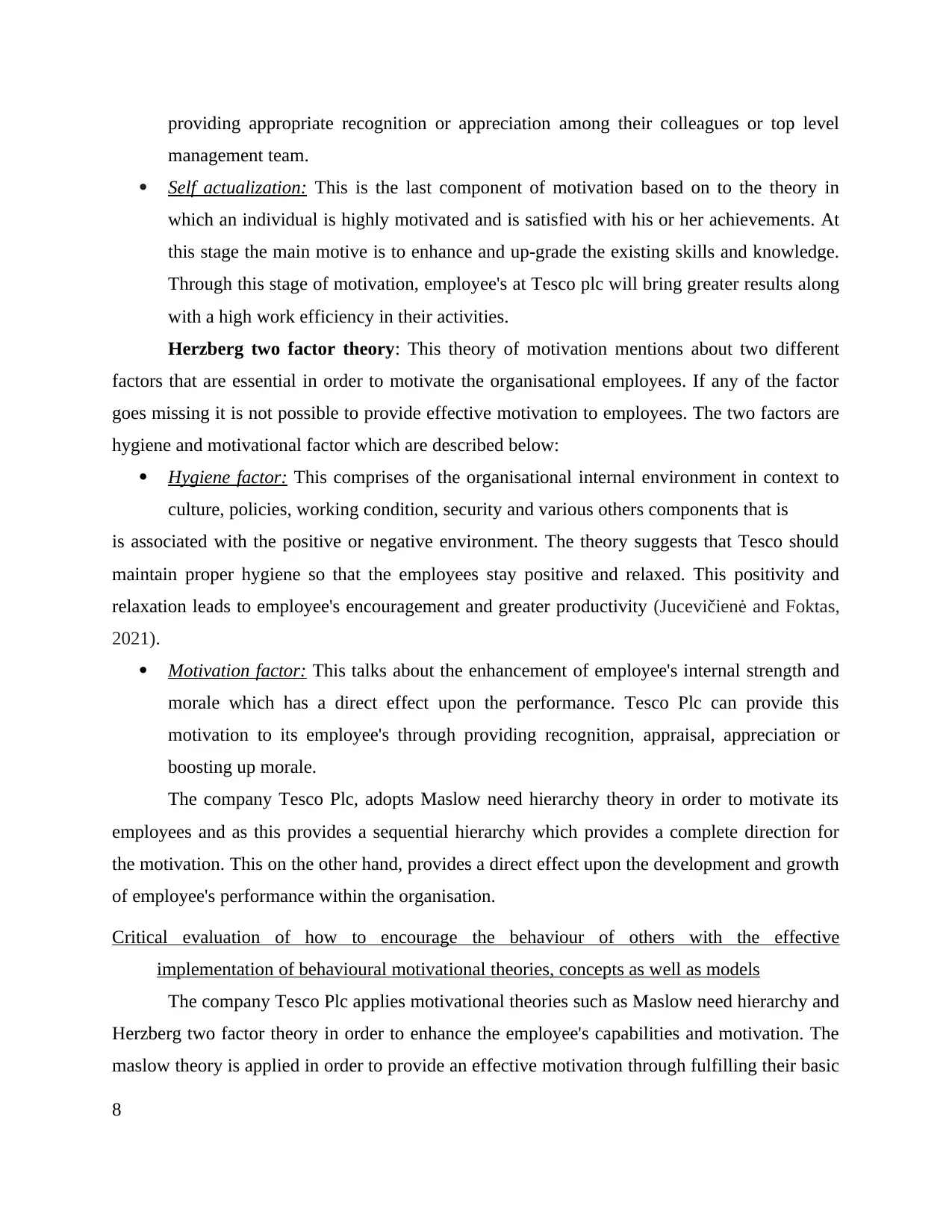
providing appropriate recognition or appreciation among their colleagues or top level
management team.
Self actualization: This is the last component of motivation based on to the theory in
which an individual is highly motivated and is satisfied with his or her achievements. At
this stage the main motive is to enhance and up-grade the existing skills and knowledge.
Through this stage of motivation, employee's at Tesco plc will bring greater results along
with a high work efficiency in their activities.
Herzberg two factor theory: This theory of motivation mentions about two different
factors that are essential in order to motivate the organisational employees. If any of the factor
goes missing it is not possible to provide effective motivation to employees. The two factors are
hygiene and motivational factor which are described below:
Hygiene factor: This comprises of the organisational internal environment in context to
culture, policies, working condition, security and various others components that is
is associated with the positive or negative environment. The theory suggests that Tesco should
maintain proper hygiene so that the employees stay positive and relaxed. This positivity and
relaxation leads to employee's encouragement and greater productivity (Jucevičienė and Foktas,
2021).
Motivation factor: This talks about the enhancement of employee's internal strength and
morale which has a direct effect upon the performance. Tesco Plc can provide this
motivation to its employee's through providing recognition, appraisal, appreciation or
boosting up morale.
The company Tesco Plc, adopts Maslow need hierarchy theory in order to motivate its
employees and as this provides a sequential hierarchy which provides a complete direction for
the motivation. This on the other hand, provides a direct effect upon the development and growth
of employee's performance within the organisation.
Critical evaluation of how to encourage the behaviour of others with the effective
implementation of behavioural motivational theories, concepts as well as models
The company Tesco Plc applies motivational theories such as Maslow need hierarchy and
Herzberg two factor theory in order to enhance the employee's capabilities and motivation. The
maslow theory is applied in order to provide an effective motivation through fulfilling their basic
8
management team.
Self actualization: This is the last component of motivation based on to the theory in
which an individual is highly motivated and is satisfied with his or her achievements. At
this stage the main motive is to enhance and up-grade the existing skills and knowledge.
Through this stage of motivation, employee's at Tesco plc will bring greater results along
with a high work efficiency in their activities.
Herzberg two factor theory: This theory of motivation mentions about two different
factors that are essential in order to motivate the organisational employees. If any of the factor
goes missing it is not possible to provide effective motivation to employees. The two factors are
hygiene and motivational factor which are described below:
Hygiene factor: This comprises of the organisational internal environment in context to
culture, policies, working condition, security and various others components that is
is associated with the positive or negative environment. The theory suggests that Tesco should
maintain proper hygiene so that the employees stay positive and relaxed. This positivity and
relaxation leads to employee's encouragement and greater productivity (Jucevičienė and Foktas,
2021).
Motivation factor: This talks about the enhancement of employee's internal strength and
morale which has a direct effect upon the performance. Tesco Plc can provide this
motivation to its employee's through providing recognition, appraisal, appreciation or
boosting up morale.
The company Tesco Plc, adopts Maslow need hierarchy theory in order to motivate its
employees and as this provides a sequential hierarchy which provides a complete direction for
the motivation. This on the other hand, provides a direct effect upon the development and growth
of employee's performance within the organisation.
Critical evaluation of how to encourage the behaviour of others with the effective
implementation of behavioural motivational theories, concepts as well as models
The company Tesco Plc applies motivational theories such as Maslow need hierarchy and
Herzberg two factor theory in order to enhance the employee's capabilities and motivation. The
maslow theory is applied in order to provide an effective motivation through fulfilling their basic
8
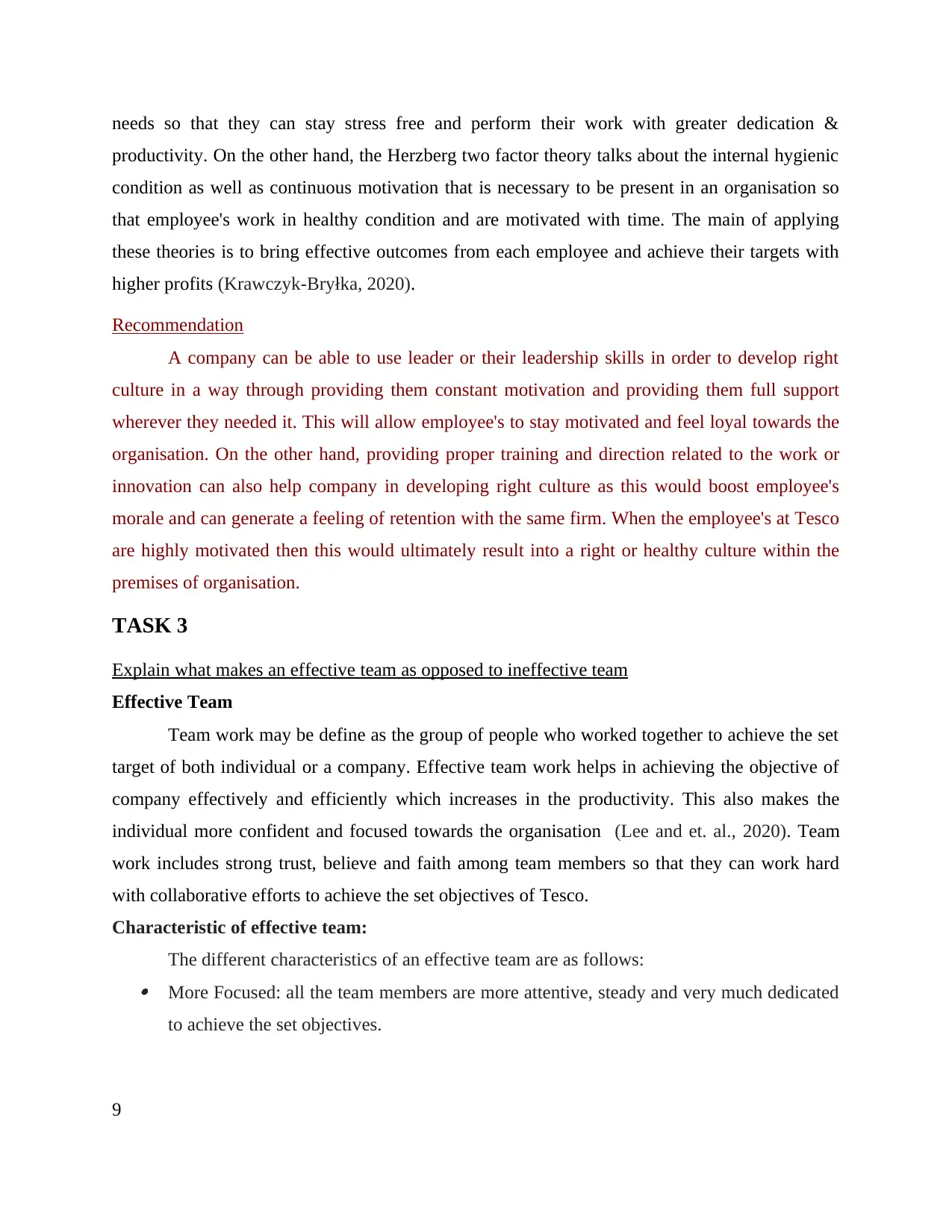
needs so that they can stay stress free and perform their work with greater dedication &
productivity. On the other hand, the Herzberg two factor theory talks about the internal hygienic
condition as well as continuous motivation that is necessary to be present in an organisation so
that employee's work in healthy condition and are motivated with time. The main of applying
these theories is to bring effective outcomes from each employee and achieve their targets with
higher profits (Krawczyk-Bryłka, 2020).
Recommendation
A company can be able to use leader or their leadership skills in order to develop right
culture in a way through providing them constant motivation and providing them full support
wherever they needed it. This will allow employee's to stay motivated and feel loyal towards the
organisation. On the other hand, providing proper training and direction related to the work or
innovation can also help company in developing right culture as this would boost employee's
morale and can generate a feeling of retention with the same firm. When the employee's at Tesco
are highly motivated then this would ultimately result into a right or healthy culture within the
premises of organisation.
TASK 3
Explain what makes an effective team as opposed to ineffective team
Effective Team
Team work may be define as the group of people who worked together to achieve the set
target of both individual or a company. Effective team work helps in achieving the objective of
company effectively and efficiently which increases in the productivity. This also makes the
individual more confident and focused towards the organisation (Lee and et. al., 2020). Team
work includes strong trust, believe and faith among team members so that they can work hard
with collaborative efforts to achieve the set objectives of Tesco.
Characteristic of effective team:
The different characteristics of an effective team are as follows: More Focused: all the team members are more attentive, steady and very much dedicated
to achieve the set objectives.
9
productivity. On the other hand, the Herzberg two factor theory talks about the internal hygienic
condition as well as continuous motivation that is necessary to be present in an organisation so
that employee's work in healthy condition and are motivated with time. The main of applying
these theories is to bring effective outcomes from each employee and achieve their targets with
higher profits (Krawczyk-Bryłka, 2020).
Recommendation
A company can be able to use leader or their leadership skills in order to develop right
culture in a way through providing them constant motivation and providing them full support
wherever they needed it. This will allow employee's to stay motivated and feel loyal towards the
organisation. On the other hand, providing proper training and direction related to the work or
innovation can also help company in developing right culture as this would boost employee's
morale and can generate a feeling of retention with the same firm. When the employee's at Tesco
are highly motivated then this would ultimately result into a right or healthy culture within the
premises of organisation.
TASK 3
Explain what makes an effective team as opposed to ineffective team
Effective Team
Team work may be define as the group of people who worked together to achieve the set
target of both individual or a company. Effective team work helps in achieving the objective of
company effectively and efficiently which increases in the productivity. This also makes the
individual more confident and focused towards the organisation (Lee and et. al., 2020). Team
work includes strong trust, believe and faith among team members so that they can work hard
with collaborative efforts to achieve the set objectives of Tesco.
Characteristic of effective team:
The different characteristics of an effective team are as follows: More Focused: all the team members are more attentive, steady and very much dedicated
to achieve the set objectives.
9
⊘ This is a preview!⊘
Do you want full access?
Subscribe today to unlock all pages.

Trusted by 1+ million students worldwide
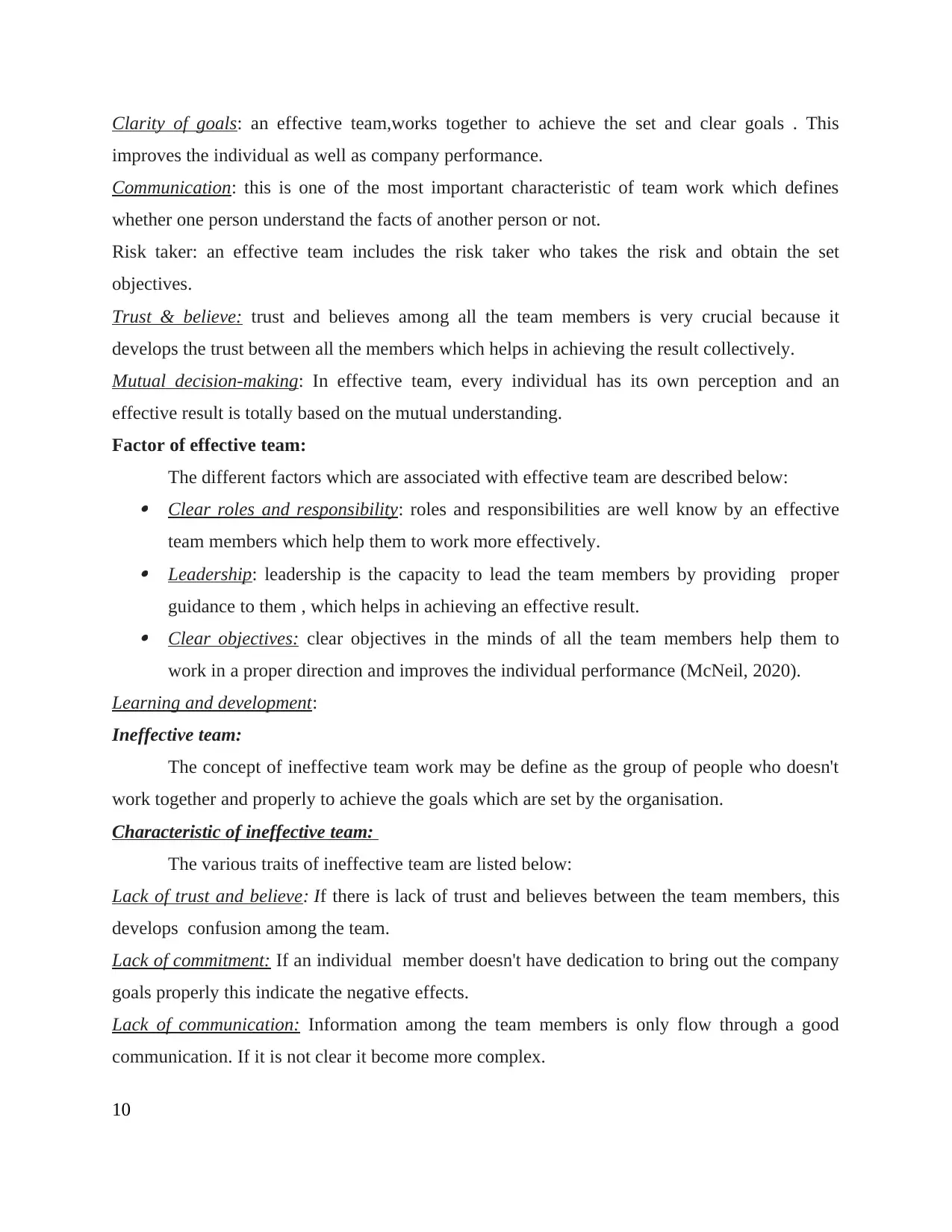
Clarity of goals: an effective team,works together to achieve the set and clear goals . This
improves the individual as well as company performance.
Communication: this is one of the most important characteristic of team work which defines
whether one person understand the facts of another person or not.
Risk taker: an effective team includes the risk taker who takes the risk and obtain the set
objectives.
Trust & believe: trust and believes among all the team members is very crucial because it
develops the trust between all the members which helps in achieving the result collectively.
Mutual decision-making: In effective team, every individual has its own perception and an
effective result is totally based on the mutual understanding.
Factor of effective team:
The different factors which are associated with effective team are described below: Clear roles and responsibility: roles and responsibilities are well know by an effective
team members which help them to work more effectively. Leadership: leadership is the capacity to lead the team members by providing proper
guidance to them , which helps in achieving an effective result. Clear objectives: clear objectives in the minds of all the team members help them to
work in a proper direction and improves the individual performance (McNeil, 2020).
Learning and development:
Ineffective team:
The concept of ineffective team work may be define as the group of people who doesn't
work together and properly to achieve the goals which are set by the organisation.
Characteristic of ineffective team:
The various traits of ineffective team are listed below:
Lack of trust and believe: If there is lack of trust and believes between the team members, this
develops confusion among the team.
Lack of commitment: If an individual member doesn't have dedication to bring out the company
goals properly this indicate the negative effects.
Lack of communication: Information among the team members is only flow through a good
communication. If it is not clear it become more complex.
10
improves the individual as well as company performance.
Communication: this is one of the most important characteristic of team work which defines
whether one person understand the facts of another person or not.
Risk taker: an effective team includes the risk taker who takes the risk and obtain the set
objectives.
Trust & believe: trust and believes among all the team members is very crucial because it
develops the trust between all the members which helps in achieving the result collectively.
Mutual decision-making: In effective team, every individual has its own perception and an
effective result is totally based on the mutual understanding.
Factor of effective team:
The different factors which are associated with effective team are described below: Clear roles and responsibility: roles and responsibilities are well know by an effective
team members which help them to work more effectively. Leadership: leadership is the capacity to lead the team members by providing proper
guidance to them , which helps in achieving an effective result. Clear objectives: clear objectives in the minds of all the team members help them to
work in a proper direction and improves the individual performance (McNeil, 2020).
Learning and development:
Ineffective team:
The concept of ineffective team work may be define as the group of people who doesn't
work together and properly to achieve the goals which are set by the organisation.
Characteristic of ineffective team:
The various traits of ineffective team are listed below:
Lack of trust and believe: If there is lack of trust and believes between the team members, this
develops confusion among the team.
Lack of commitment: If an individual member doesn't have dedication to bring out the company
goals properly this indicate the negative effects.
Lack of communication: Information among the team members is only flow through a good
communication. If it is not clear it become more complex.
10
Paraphrase This Document
Need a fresh take? Get an instant paraphrase of this document with our AI Paraphraser
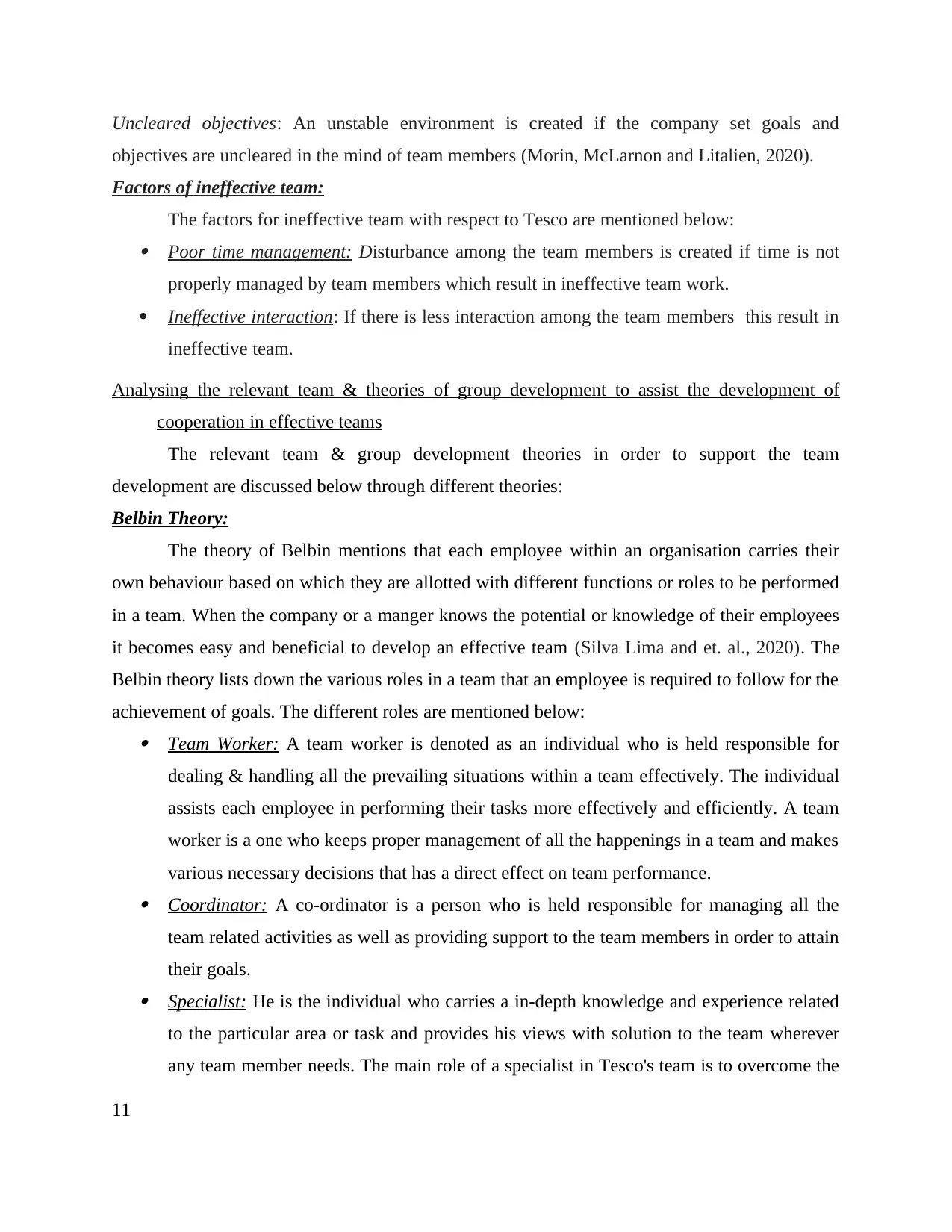
Uncleared objectives: An unstable environment is created if the company set goals and
objectives are uncleared in the mind of team members (Morin, McLarnon and Litalien, 2020).
Factors of ineffective team:
The factors for ineffective team with respect to Tesco are mentioned below: Poor time management: Disturbance among the team members is created if time is not
properly managed by team members which result in ineffective team work.
Ineffective interaction: If there is less interaction among the team members this result in
ineffective team.
Analysing the relevant team & theories of group development to assist the development of
cooperation in effective teams
The relevant team & group development theories in order to support the team
development are discussed below through different theories:
Belbin Theory:
The theory of Belbin mentions that each employee within an organisation carries their
own behaviour based on which they are allotted with different functions or roles to be performed
in a team. When the company or a manger knows the potential or knowledge of their employees
it becomes easy and beneficial to develop an effective team (Silva Lima and et. al., 2020). The
Belbin theory lists down the various roles in a team that an employee is required to follow for the
achievement of goals. The different roles are mentioned below: Team Worker: A team worker is denoted as an individual who is held responsible for
dealing & handling all the prevailing situations within a team effectively. The individual
assists each employee in performing their tasks more effectively and efficiently. A team
worker is a one who keeps proper management of all the happenings in a team and makes
various necessary decisions that has a direct effect on team performance. Coordinator: A co-ordinator is a person who is held responsible for managing all the
team related activities as well as providing support to the team members in order to attain
their goals. Specialist: He is the individual who carries a in-depth knowledge and experience related
to the particular area or task and provides his views with solution to the team wherever
any team member needs. The main role of a specialist in Tesco's team is to overcome the
11
objectives are uncleared in the mind of team members (Morin, McLarnon and Litalien, 2020).
Factors of ineffective team:
The factors for ineffective team with respect to Tesco are mentioned below: Poor time management: Disturbance among the team members is created if time is not
properly managed by team members which result in ineffective team work.
Ineffective interaction: If there is less interaction among the team members this result in
ineffective team.
Analysing the relevant team & theories of group development to assist the development of
cooperation in effective teams
The relevant team & group development theories in order to support the team
development are discussed below through different theories:
Belbin Theory:
The theory of Belbin mentions that each employee within an organisation carries their
own behaviour based on which they are allotted with different functions or roles to be performed
in a team. When the company or a manger knows the potential or knowledge of their employees
it becomes easy and beneficial to develop an effective team (Silva Lima and et. al., 2020). The
Belbin theory lists down the various roles in a team that an employee is required to follow for the
achievement of goals. The different roles are mentioned below: Team Worker: A team worker is denoted as an individual who is held responsible for
dealing & handling all the prevailing situations within a team effectively. The individual
assists each employee in performing their tasks more effectively and efficiently. A team
worker is a one who keeps proper management of all the happenings in a team and makes
various necessary decisions that has a direct effect on team performance. Coordinator: A co-ordinator is a person who is held responsible for managing all the
team related activities as well as providing support to the team members in order to attain
their goals. Specialist: He is the individual who carries a in-depth knowledge and experience related
to the particular area or task and provides his views with solution to the team wherever
any team member needs. The main role of a specialist in Tesco's team is to overcome the
11
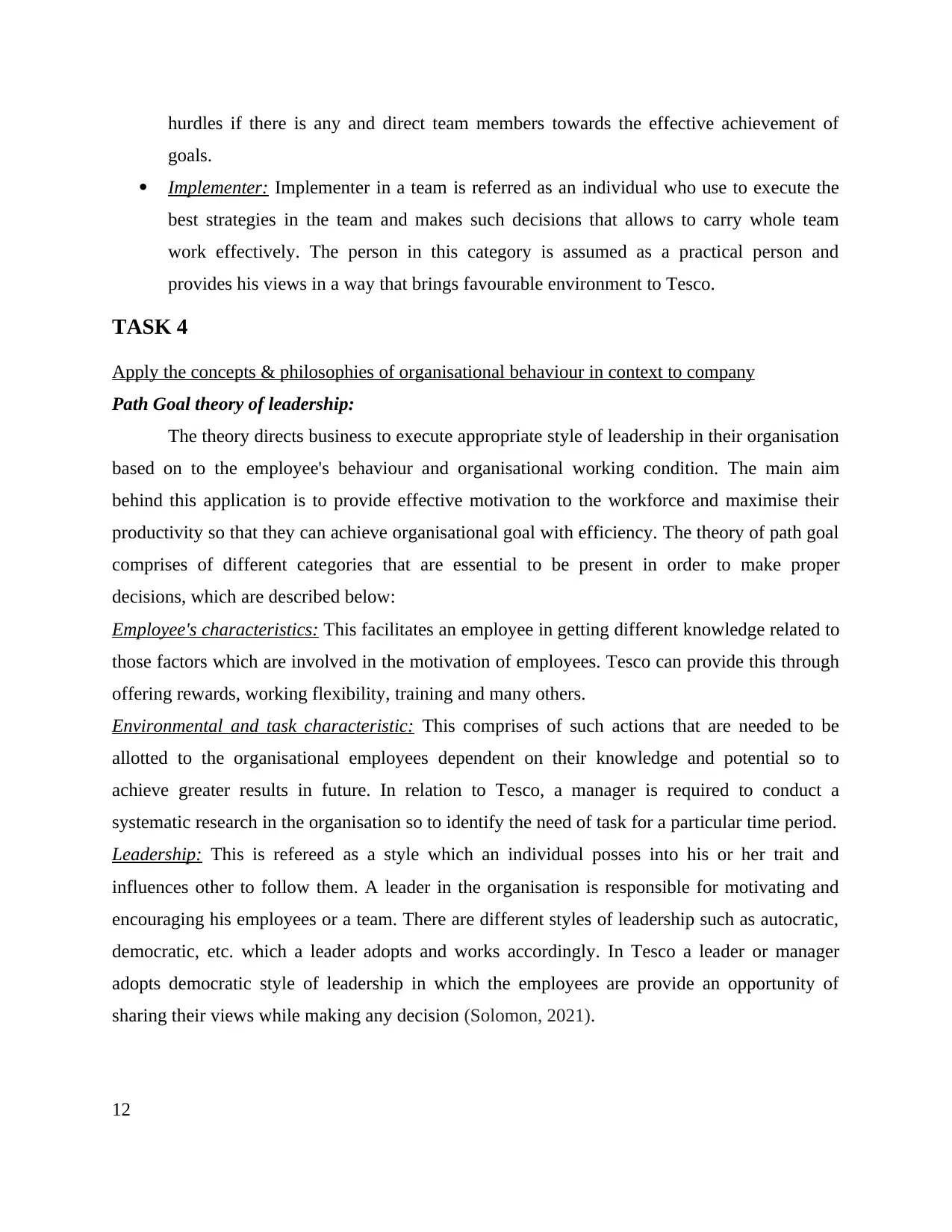
hurdles if there is any and direct team members towards the effective achievement of
goals.
Implementer: Implementer in a team is referred as an individual who use to execute the
best strategies in the team and makes such decisions that allows to carry whole team
work effectively. The person in this category is assumed as a practical person and
provides his views in a way that brings favourable environment to Tesco.
TASK 4
Apply the concepts & philosophies of organisational behaviour in context to company
Path Goal theory of leadership:
The theory directs business to execute appropriate style of leadership in their organisation
based on to the employee's behaviour and organisational working condition. The main aim
behind this application is to provide effective motivation to the workforce and maximise their
productivity so that they can achieve organisational goal with efficiency. The theory of path goal
comprises of different categories that are essential to be present in order to make proper
decisions, which are described below:
Employee's characteristics: This facilitates an employee in getting different knowledge related to
those factors which are involved in the motivation of employees. Tesco can provide this through
offering rewards, working flexibility, training and many others.
Environmental and task characteristic: This comprises of such actions that are needed to be
allotted to the organisational employees dependent on their knowledge and potential so to
achieve greater results in future. In relation to Tesco, a manager is required to conduct a
systematic research in the organisation so to identify the need of task for a particular time period.
Leadership: This is refereed as a style which an individual posses into his or her trait and
influences other to follow them. A leader in the organisation is responsible for motivating and
encouraging his employees or a team. There are different styles of leadership such as autocratic,
democratic, etc. which a leader adopts and works accordingly. In Tesco a leader or manager
adopts democratic style of leadership in which the employees are provide an opportunity of
sharing their views while making any decision (Solomon, 2021).
12
goals.
Implementer: Implementer in a team is referred as an individual who use to execute the
best strategies in the team and makes such decisions that allows to carry whole team
work effectively. The person in this category is assumed as a practical person and
provides his views in a way that brings favourable environment to Tesco.
TASK 4
Apply the concepts & philosophies of organisational behaviour in context to company
Path Goal theory of leadership:
The theory directs business to execute appropriate style of leadership in their organisation
based on to the employee's behaviour and organisational working condition. The main aim
behind this application is to provide effective motivation to the workforce and maximise their
productivity so that they can achieve organisational goal with efficiency. The theory of path goal
comprises of different categories that are essential to be present in order to make proper
decisions, which are described below:
Employee's characteristics: This facilitates an employee in getting different knowledge related to
those factors which are involved in the motivation of employees. Tesco can provide this through
offering rewards, working flexibility, training and many others.
Environmental and task characteristic: This comprises of such actions that are needed to be
allotted to the organisational employees dependent on their knowledge and potential so to
achieve greater results in future. In relation to Tesco, a manager is required to conduct a
systematic research in the organisation so to identify the need of task for a particular time period.
Leadership: This is refereed as a style which an individual posses into his or her trait and
influences other to follow them. A leader in the organisation is responsible for motivating and
encouraging his employees or a team. There are different styles of leadership such as autocratic,
democratic, etc. which a leader adopts and works accordingly. In Tesco a leader or manager
adopts democratic style of leadership in which the employees are provide an opportunity of
sharing their views while making any decision (Solomon, 2021).
12
⊘ This is a preview!⊘
Do you want full access?
Subscribe today to unlock all pages.

Trusted by 1+ million students worldwide
1 out of 16
Related Documents
Your All-in-One AI-Powered Toolkit for Academic Success.
+13062052269
info@desklib.com
Available 24*7 on WhatsApp / Email
![[object Object]](/_next/static/media/star-bottom.7253800d.svg)
Unlock your academic potential
Copyright © 2020–2026 A2Z Services. All Rights Reserved. Developed and managed by ZUCOL.



